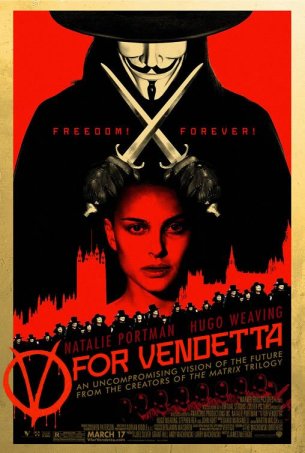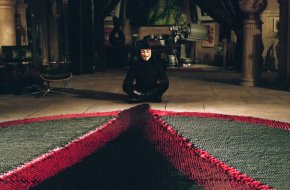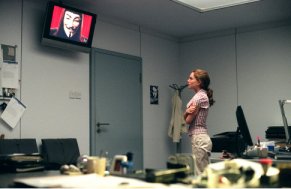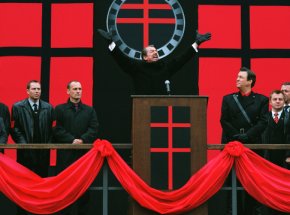|
V
For Vendetta
You can't kill an idea. At least, that's
what the mysterious masked V claims in V For Vendetta.
Exactly which idea the film is trying to keep alive will
be debated for some time.
To
call the Wachowski Brothers' latest (directed by James McTeigue)
a screed against our current administration misses the point.
Most of the more superficial elements of Alan Moore and
David Lloyd's original
graphic novel have made it to the screen, and if those
seem way too allegorical with modern times, well, read 1984
sometime.
True, the film does make references to
the United States, but they are in passing, only adding
detail to the disdain this future England has for "the other."
Homosexuality, non-Christian religion and other ethnicities
all seem forbidden here, but really, that's nothing new
at all.
When a biological attack decimated a school,
something had to be done. Politician Adam Sutler (John Hurt)
was the man to do that something, creating a system and
a society to make sure that "England prevails."
What
should make people uncomfortable is just how easy it is
for Sutler to do so. Television tells the masses what to
think, most notably in the form of a bombastic talking head,
Lewis Prothero (Roger Allam). Some intellectuals survive,
but they've traded in their integrity for comfort and survival.
If they rebel at all, it's quiet and meant not to be noticed,
as illustrated by Stephen Fry's warm and witty comedian/talk
show host Dietrich.
Into this
society explodes V (Hugo Weaving, doing incredible work while
faceless). Wearing the implacable mask of British folk hero
Guy Fawkes and inspired by The Count of Monte Cristo,
V rescues Evey (Natalie Portman) from being raped by the police.
He dazzles her with wordplay, and then shows her the sights
of London, including his blowing up the Old Bailey as his
first public salvo in his revenge against the State.
What the State did to V is just one mystery
in the plot, and the Wachowski Brothers' script puts a little
too much weight upon it. Perhaps it had to be done, but
many things in the film feel flattened out to make them
more palatable for mainstream audiences.
The most crucial element, though, remains
at its most powerful. There's no getting around that V is
a terrorist. McTeigue's direction takes pains to let us
think he doesn't kill anyone that doesn't deserve it, but
there's bound to be some collateral damage in human lives.
As charming and clever as V is, he's also
hard to fully trust, and the script doesn't shy away from
that. The film keeps a second act twist from the graphic
novel that speaks volumes about how far gone he is, though
it reduces his motivation a little bit. Where Alan Moore
danced around madness, the Wachowskis waltz with justified
outrage taken too far.
They've also changed some characterizations,
again nodding to film conventions. So that Portman could
believably be Evey, she's now a grown woman, not someone
easily swayed by the hypnotic power of a charismatic madman.
(Though technically, that's what Sutler has become.) It
does perhaps better illustrate how much we want to believe
in authority when seen through an adult Evey's eyes.
Every good mystery needs a detective, and
V For Vendetta focuses on the slightly rumpled Finch
(Stephen Rea). If Sutler's panel of advisors are The Hand,
Finch must be the thumb, sticking up and sore. He provides
the political insight that Evey lacks, even though she's
the daughter of alleged revolutionaries. In the wake of
her being orphaned, she's kept herself willfully ignorant.
Instead of giving audiences the expected,
from time to time V For Vendetta takes risks with
its narrative. At one point, it meanders into the story
of a long ago prisoner, with meaning that takes a while
to decipher. But it also bumbles a couple of elements of
mystery, introducing and dispatching a character played
by Sinead Cusack so quickly that we don't have time to feel
anything for her. Some of the drama of V's righteousness
is lost.
So,
too, are the nuances of the politics. Though the film makes
a half-hearted bow to anarchy, it's clear that this more
about restoring a sense of "we the people" than letting
people do what they want. In case you miss that point, the
film makes it absolutely clear with its ending vastly different
from the graphic novel. Moore left us with a sense of ambiguous
hope; the Wachowskis tie things up a lot more neatly.
As
to whether or not they gave McTeigue much rope, that too
may remain a mystery. At times, his direction seems rather
claustrophobic, full of tight shots and a sense of London
being very closed in. The action isn't as slick as in The
Matrix films, and adding in "sword time" instead of
"bullet time" probably wasn't necessary. Let the ideas do
the fighting.
But then, studios are afraid to do that,
too. Whether or not you agree with the ideas espoused here,
V For Vendetta should spark considerable conversation.
Are we talking revolution? Or is it enough to just look
around and really see the world pulled over our eyes?
For sparking such questions, V For Vendetta
deserves a place of honor this year.
Rating:

|









